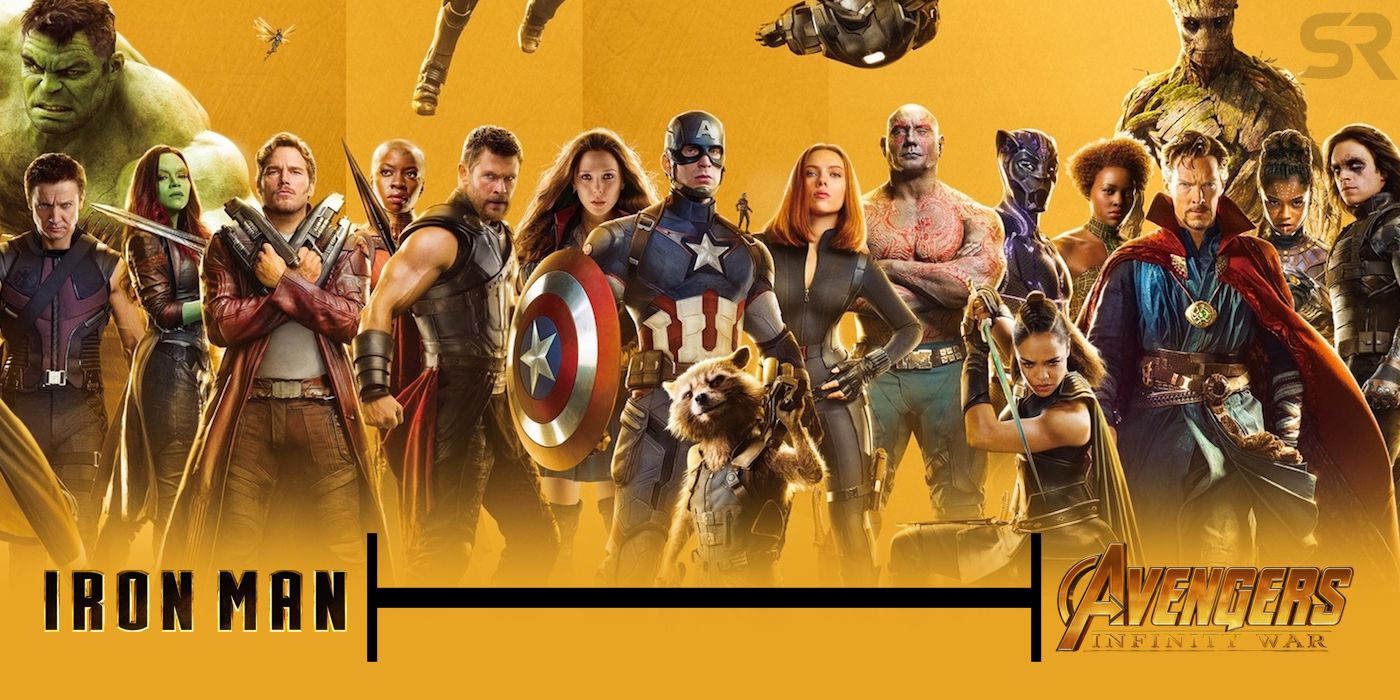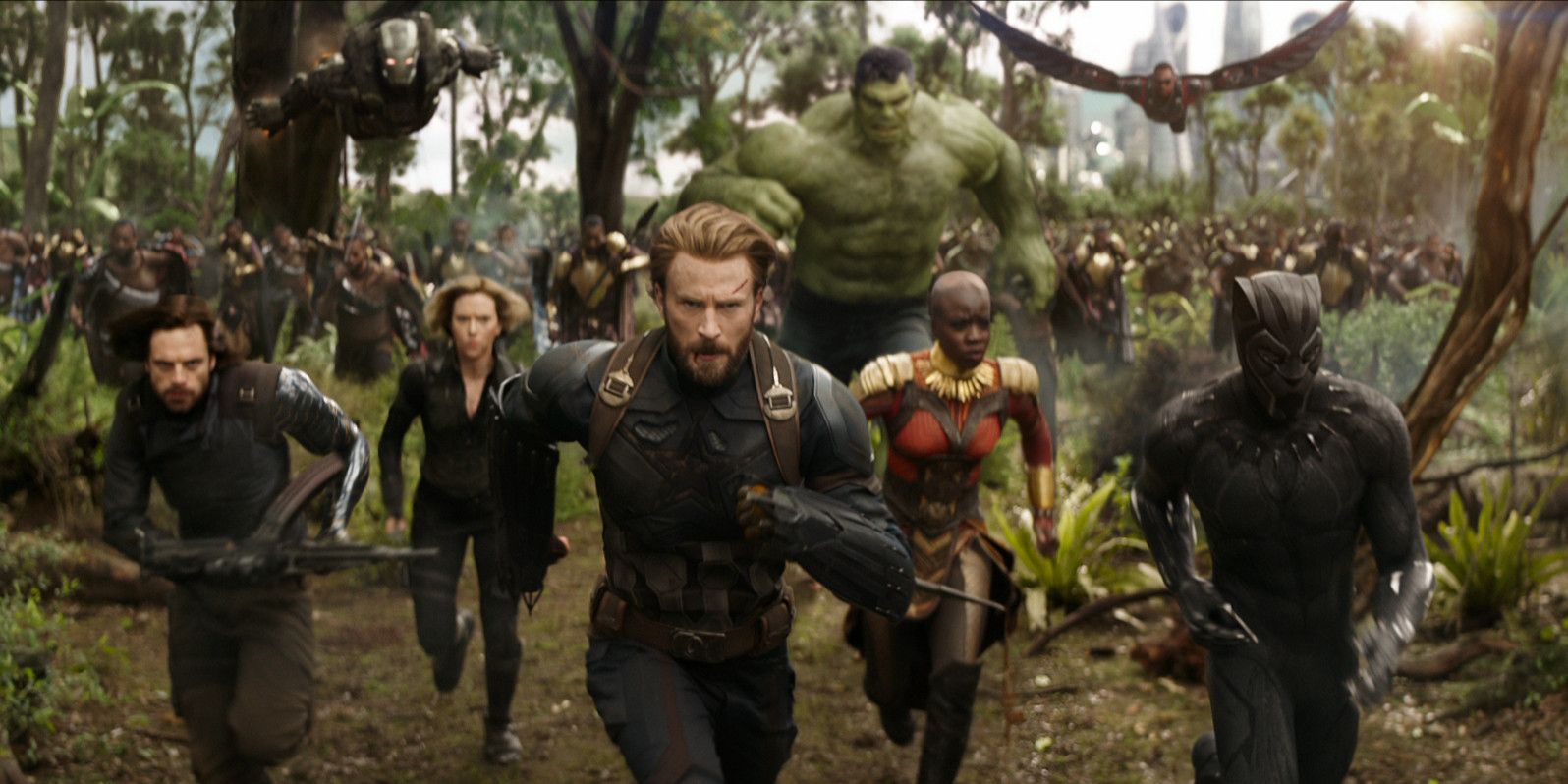
Marvel Studios has released a timeline of the MCU in honor of their 10-year anniversary. Featuring every movie up to this year's Avengers: Infinity War, the timeline comes as part of the Marvel Studios: The First 10 Years sourcebook and aims to clear up confusion over how Marvel's shared universe works.
While the MCU, for the most part, has kept an incredibly tight and consistent continuity (give or take a Tony Stark consulting role), the specifics of their timeline have been repeatedly called into question as specific dates of movies set across decades begin to stop lining up. This is inevitable with Marvel's shared universe model; sooner or later, continuity errors are sure to crop up. Most famously, last year's Spider-Man: Homecoming caused major problems with a reference to what was later described as a "highly incorrect" eight-year time jump from The Avengers. In response, Kevin Feige promised that Marvel would release an official timeline of the MCU.
Related: How Avengers: Infinity War Corrected Marvel’s Broken Timeline
Titan's Marvel Studios: The First 10 Years includes a timeline that explores the history of the Marvel Cinematic Universe to date. It goes from the very creation of the universe to Thanos' hunt for the Infinity Stones, detailing all the key events in-between. Thanks to the dates provided, it also provides a breakdown of what year Marvel views each movie as taking place:
- 1943-1945: Captain America: The First Avenger
- 2010: Iron Man
- 2011: Iron Man 2, The Incredible Hulk, Thor
- 2012: The Avengers, Iron Man 3
- 2013: Thor: The Dark World
- 2014: Captain America: The Winter Soldier, Guardians of the Galaxy, Guardians of the Galaxy Vol. 2
- 2015: Avengers: Age of Ultron, Ant-Man
- 2016: Captain America: Civil War, Spider-Man: Homecoming
- 2016 through to 2017: Doctor Strange
- 2017: Black Panther, Thor: Ragnarok, Avengers: Infinity War
While it's unclear how much input Marvel Studios and Kevin Feige had in the dates on the timeline, it's nevertheless the closest Marvel has yet come to making an official statement on just when the different MCU events are set.

The timeline was presumably prepared before the release of Ant-Man & the Wasp, which is unlisted, although its post-credits scenes establish that film as happening shortly before Avengers: Infinity War, so it's not too difficult to place. Looking closely, it will be immediately apparent that Marvel has switched things up a little, largely for thematic reasons; Iron Man has been moved to 2010, closer to the events of Iron Man 2, for example.
The Phase 3 timeline is the most interesting, though. Doctor Strange director Scott Derrickson had indicated that his movie spans a 12-month period, but it had previously been believed that ran from 2015 through to 2016. Instead, it has been moved forward a year, possibly to reduce the amount of time between that film and Strange's cameo in Thor: Ragnarok. That approach fits perfectly with small details from the production of Doctor Strange, such as awards Strange apparently gained for his work as a neurosurgeon in 2016. Black Panther has also been moved to 2017, presumably to explain why Wakanda hasn't significantly opened its borders by the time of Avengers: Infinity War. Curiously, Infinity War is also apparently considered set in 2017, possibly because its events spin straight out Thor: Ragnarok's mid-credits scene.
While many of the changes to the movie timeline make sense for story purposes, they do ignore a number of explicit references from the films themselves - for example, dialogue in Avengers: Infinity War specifically states that it is set two years after the events of Captain America: Civil War. The most problematic is the moving of Black Panther, which dates itself just a week after Civil War; it hardly makes sense for T'Challa to leave his people without a king for a year. Kevin Feige had suggested the official timeline would fix continuity issues, but while this one solves some, it also raises a lot of new ones thanks to specific dialogue.
Read More: It's Impossible To Fix Marvel's Broken Timeline
While the timeline doesn't include the wider MCU such as the TV shows or Prelude comics, it does confirm dates previously revealed only in tie-in media. The timeline honors key dated events in the lives of Steve Rogers and the Red Skull from the Captain America: First Vengeance comics, for example. Furthermore, some details correspond with Marvel Television too; according to the timeline, S.H.I.E.L.D. formed in 1949. This fits perfectly with throwaway dialogue in Agents of S.H.I.E.L.D. season 4, which had suggested Peggy Carter became head of the SSR that year.
How this timeline is reflected in future Marvel movies (or if Avengers 4's time travel will affect it in any way) remains to be seen. For now, there's some sense of balance to the MCU continuity.
More: A Complete History Of The Marvel Cinematic Universe
from ScreenRant - Feed https://ift.tt/2DukQDf





No comments: